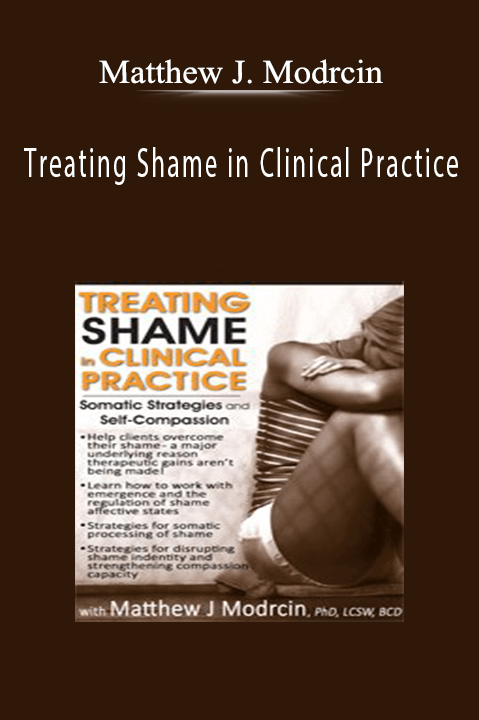Treating Shame in Clinical Practice: Somatic Strategies and Self-Compassion – Matthew J. Modrcin
- Help clients overcome their shame – a major underlying reason therapeutic gains aren’t being made!
- Learn how to work with emergence and the regulation of shame affective states
- Strategies for somatic processing of shame
- Strategies for disrupting shame identity and strengthening compassion capacity
How often do you and your clients come to an impasse in the therapeutic process? Change appears stalled and your clients’ progress is limited – and for most of us in clinical practice, navigating this impasse is challenging.
In this workshop you will learn how to identify and work with shame to restore the therapeutic alliance and re-engage the client in their process of change. Shame is not only a highly toxic affective state but also an embodied experience. In a constant state of vigilance against additional exposure to shaming events, the client is unable to access internal healing resources and is often reluctant to engage in therapy.
If you miss the tell-tale signs of shame, you not only rupture the therapeutic alliance – you’ll hinder any progress toward healing. Like me at one time in my practice, and like many others in our field, you have difficulty identifying shame, as the experience is often disguised as avoidance, rage, anger or sadness.
Leave the seminar armed with superior skills of seeing when shame is present, how it is adversely impacting the therapeutic alliance, and why progress has stalled – and give the client strategies to replace shame with self-compassion.
- Identify developmental and trauma perspectives of shame.
- Facilitate shame and self-compassion affective and embodied states.
- Experience shame activation (self and client’s) within the therapeutic relationship and identify alliance ruptures.
- Apply strategies to restore the interpersonal connection when shame emerges.
- Explore the therapeutic relationship for self-compassion expressions.
- Apply strategies with couples and groups.
The Roots of Shame
- Interpersonal origins
- Developmental perspective
- Trauma perspective
- Affective-somatic perspective
The Therapist Shame Experience
- How clinical models can shame
- Barrier to creativity and relational presence
- Releasing the shame response
Shame and the Distortion of Self
- Shame-based identity
- Adaptive qualities
- Defense against connection
When Shame is Activated – Interventions for Working With:
- Affective processing
- Somatic processing
- Observing and entering the shame activation
Therapeutic Strategies
- Increasing tolerance of shame states
- Holding the emergence of affect
- Amplification of positive affects for connection
- Compassion modeling
- Managing enactment moments
- Transparency and self-disclosure
Engaging and Sustaining Self-Compassion
- Definitions
- Affective states
- Somatic states
- Narratives of self-compassion
- Set-backs and restorations
Additional Clinical Contexts
- Couples therapy
- Group therapy
Get Download Treating Shame in Clinical Practice: Somatic Strategies and Self-Compassion – Matthew J. Modrcin at Offimc.click Now!
Delivery Information
- Upon ordering the product, a delivery email with download instructions will be sent immediately to you so that you may download your files. If you log in (or create an account) prior to purchase you will also be able to access your downloads from your account dashboard.
- It is a digital download, so please download the order items and save them to your hard drive. In case the link is broken for any reason, please contact us and we will resend the new download link to you.
- If you don't receive the download link, please don’t worry about that. We will update and notify you as soon as possible from 8:00 AM – 8:00 PM (UTC+8).
- Please Contact Us if there are any further questions or concerns you may have. We are always happy to assist!








12 reviews for Matthew J. Modrcin – Treating Shame in Clinical Practice: Somatic Strategies and Self–Compassion
There are no reviews yet.